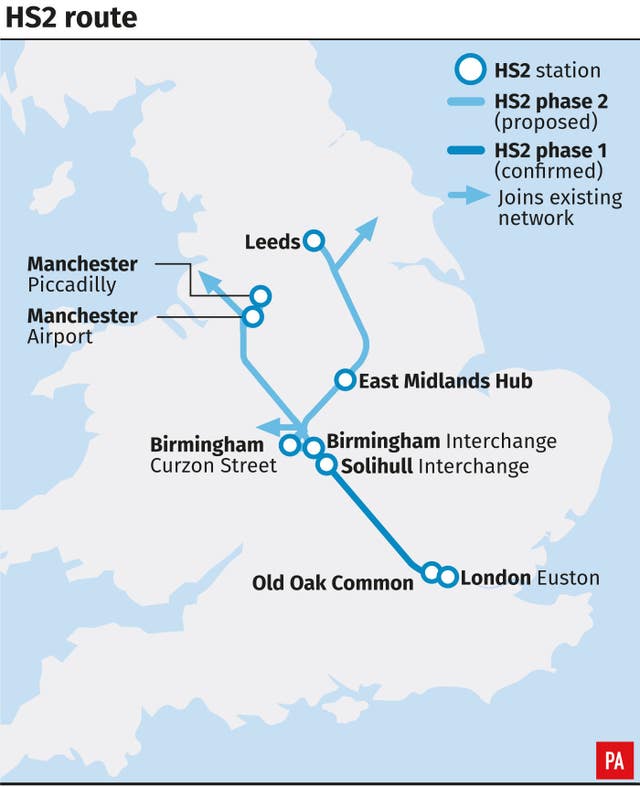
There will be no unplanned delays due to HS2 track problems, the company building the high speed railway has claimed.
In a UK first, infrastructure monitoring equipment such as video, lasers and acoustic sensors will be fitted to passenger trains to assess the condition of rail and overhead power cables.
Engineers will analyse the data in real time, meaning they can identify any problems and carry out maintenance before a fault affects punctuality on the £55.7 billion railway, according to HS2 Ltd.
A spokesman for the government-funded company said this will make emergency engineering work, speed restrictions and unplanned delays “a thing of the past” on the new line.
Nearly one million (999,715) minutes were lost to delays caused by track issues across Britain’s rail network in 2017/18, according to Press Association analysis of Office of Rail and Road data.
This was roughly 7% of the total number of delay minutes.
Passenger services are not fitted with monitoring equipment, meaning government-owned company Network Rail must deploy a fleet of trains, helicopters and drones to carry out the work.
HS2 Ltd’s asset management director Mark Morris said: “Our aim is simple: to design HS2 around passengers and create a unique experience in terms of its look, feel and ease of use.
“We’re aiming for outstanding punctuality with the ability to predict infrastructure issues before they occur. If there are delays they will only be counted in seconds.”
HS2 trains travelling at up to 225 mph will assess the condition of infrastructure using three types of equipment, consisting of:
– Acoustic sensors listening to how wheels run on rails
– Lasers measuring the precise distance between the left and right rail
– Video monitoring overhead powerlines
Mr Morris said this will result in problems being identified, investigated and resolved “well before passengers notice a change in ride quality”.
He went on: “We’re aiming for you to be able to set your watch by HS2 and using this track monitoring technology will help us to achieve that.
“It will be the international benchmark for railway reliability so that in the future when you think of the country that offers utter railway punctuality, the UK – and not Japan or Switzerland – will come to mind.”

Phase 1 of the railway will open between London and Birmingham in December 2026.
A second Y-shaped phase of HS2 will launch in two stages.
Phase 2a from the West Midlands to Crewe will begin in 2027, followed by Phase 2b from Crewe to Manchester, and Birmingham to Leeds, in 2033.
The high-tech maintenance regime will also be deployed on the east and west coast mainlines as far north as Edinburgh and Glasgow, as high-speed trains will run beyond the new line.
A competition to win a £2.75 billion deal to design, build and maintain around 60 HS2 trains to come into service from 2026 was launched in November last year.
Future contracts will add more trains once Phase 2b is completed.


Comments: Our rules
We want our comments to be a lively and valuable part of our community - a place where readers can debate and engage with the most important local issues. The ability to comment on our stories is a privilege, not a right, however, and that privilege may be withdrawn if it is abused or misused.
Please report any comments that break our rules.
Read the rules hereLast Updated:
Report this comment Cancel